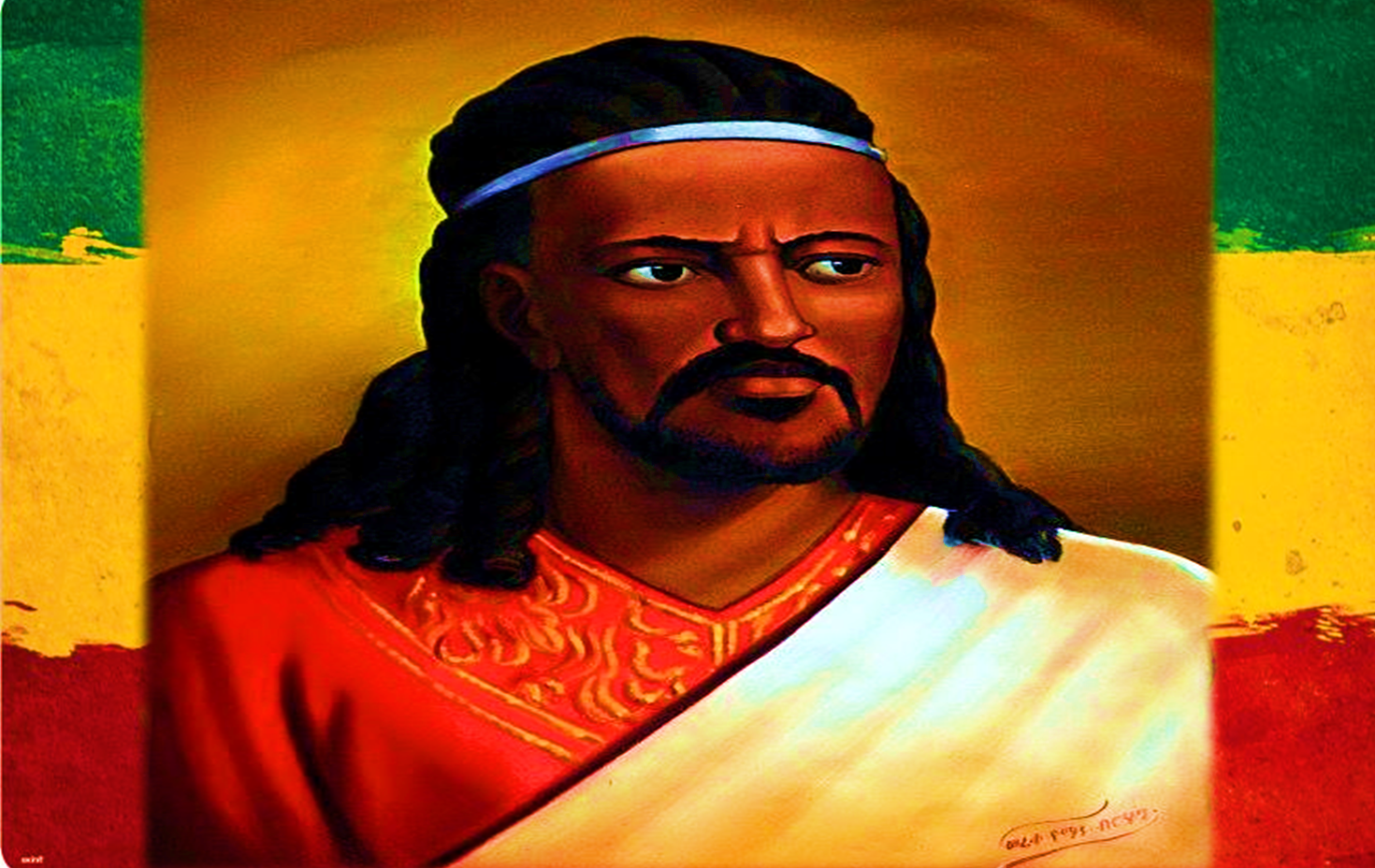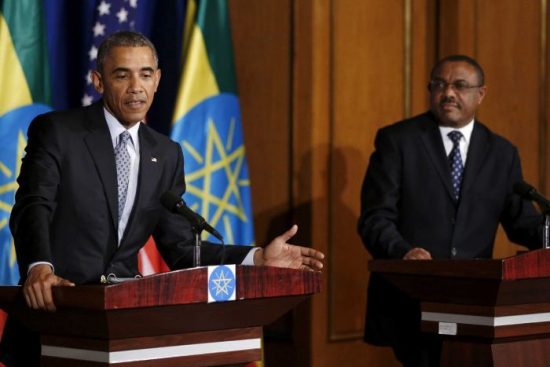
Maligned by British educators for more than a century, the true story of Atse Tewodros is one of a visionary who united Ethiopia.
We live in the age of anti-heroes where people who have taken the mantle of leaders think the meaning of sacrifice is to wait until they vacate political office before they make millions of dollars. The zeitgeist is all about self; pursuing wealth is painted as virtue and audacity is defined through the prism of self-gratification. Scan through the history books and the list of moral giants is astounding—men and women like Martin Luther King, Malcolm X, Joan of Arc and Mother Theresa, to name just a few of many—gave of themselves in order to advance humanity. The past has been flipped on its head; we are now beset by imps who feed themselves while starving the people.
Where have my heroes gone? This is a question I ponder frequently. We have entered into a paradigm where the moral giants of the past have been replaced with mental midgets who thrive for themselves while paying lip service to the people that they lead. This is why most of us feel like the world is going to the dogs; in a time that sorely needs leadership above everything else, we are being led in too many quarters by vacuous demagogues who are guiding us right into the wilderness. Perhaps, at a time like this, it is wise to take a pause and reflect on the past in order to chart a course forward.
It is with this in mind that I write today about one of the greatest leaders who is rarely mentioned in the history books. Atse Tewodros II was a once king of Ethiopia who united a fractured nation through one part sheer tenacity and another part benevolence befitting of a monk. If there was ever a story that comes closest to that of a real life Robin Hood, Atse Tewodros is the person that fits that mold perfectly. Yet, even in my native land Ethiopia, few people know his real life story and fewer still understand what motivated him to sacrifice his life in order to protect his nation from the clutches of European hegemony.
The Battle of Adwa is noted as one of the most astonishing military victories ever recorded in the history books. By the middle of the 19th century, most of what is now referred to as Africa was carved up into areas of influence by western imperialists. Nations such as France, Great Britain, Spain and Belgium saw it as their God given right to subjugate free people into a life of perpetual oppression. Consequently, genocides that surpass the evils of Hitler were committed upon the continent which was once called Ethiopia for more than a century by the forefathers of the globalists who are currently bleeding the entire planet.

One speck of space stood out in “Africa”; a nation that remained intact since biblical times refused to give their hands to colonial monsters. Where Ethiopia stood in defiance against tyranny, Italy saw an opportunity to join the imperialist club. Thus, in 1891 Italy invaded Ethiopia. They came with a spirit of Julius Caesar bellowing “Veni, vidi, vici” aiming to restore the Roman empire by subduing a free nation. Ethiopian jegnas (heroes) had other plans; as Italians came at us with guns saying “veni, vidi”, we sent them backward packing with a bold embi (no). A unified Ethiopian army reduced the hubris of Rome into ashes at Adwa. The victory of Ethiopians in Adwa was a defining moment in the history of “Africa”—the arrogance of greed was undone by a people who were united by love and a sense of purpose.
The battle of Adwa would not have been possible had it not been for the tenacity and leadership of Atse Tewodros II. Before Atse Tewodros rose to power, Ethiopia was beset with strife, internecine warfare and perpetual battles. Leaders were more worried about enriching themselves than they were about serving their people. Ethiopia was in the era known as Zemene Mesafint, the age of princes, a time that saw the oldest continuous empire crumbling under the weight of selfishness and rulers who served only their egos. This is how empires fall; when leaders turn away from serving and instead lead with hubris and arrogance, the fiber of a nation gets eaten away—pride, after all, goeth before destruction.
It was Atse Tewodros II who stepped into the vacuum of leadership and decided to govern with grit and valor. A man who was of the people, Atse Tewodros was the unlikeliest of kings because he was a man who was more servant than he was a royal. Before he gained the throne, Atse Tewodros went by the name of Kassa Hailu. Young Kassa was raised by a single mother after his parents parted ways. Kassa’s mother took him back to Gondar, Ethiopia when he was still a child. It was in Gondar where Hailu planted his roots and would return one day to become emperor and keep intact the lineage of kings that traces their roots back to Judah and King Solomon. This is why Ethiopians are referred to as the tribe of Judah and why the kings and queens of Ethiopia were called Solomonistic rulers.
Though he was born into royalty and his family tree was full of nobility, Kassa would end up living a life of hardship as both he and his mother saw their fair share of struggles. In fact, Kassa was often derided by the elites of his time and was frequently derided by upper class for being a son of a peasant. A quasi-caste system made life unbearable for the every day citizens of Ethiopia during the age of princes. The story of Atse Tewodors II and the influences hardship had on his faith and his treatment of his fellow Ethiopians is one that is seldom mentioned these days because neo-colonialists who deploy their puppets in “Africa” and throughout the world would rather celebrate fame than honor a life of service.

As long as we are busy chasing the pleasure of the flesh, the easier it is to subdue people into a life of material bondage. Kassa Hailu was far from a materialist, he was the quintessence of a prince for true royalty is gained through integrity not by inheritance. Between a life of labor and a time he spent at a monastery earlier in life in order to flee persecution would inculcate in the soul of Kass Hailu at once an abiding faith in God and an identification with the struggles of the common man. In Ethiopia, the life and legacy of Menelik II and Haile Selassie are often celebrated but little celebration is afforded Atse Tewodros II by authorities, it is better to be quiet about a nobleman like Atse Tewodros than to praise him and be gauged according to his legacy.
Hardship would end up being a blessing for Kassa; while the nobility were busy living a life of royalty, Kassa saw up close and personal struggles the lower rung of society were going through. It was this perspective that gave birth to Kassa’s fierce determination to unite Ethiopia as one and to end the Zemene Mesafint. Before he gained power, Kassa became a “shifta”, another word for bandit in Amharic. What the elites gave him as an insult, Kassa wore as a badge of pride as he went about reclaiming the excesses the bankrupt nobility hoarded for themselves and instead gave the riches of Ethiopia back to the people. The leadership of Kassa was legendary; he refused to do as leaders always do and gave very little to himself. The lion's share went to the pride, Atse Tewodros's royalty was found in this spirit of giving. #Ethiopia #Jegna Click To Tweet
It was this selflessness and care for the people that earned him the undying loyalty of his troops and the people as a whole. Feed the people and the people will be an army that will follow leaders who nourish their hopes through any fire that is before them. Kassa started off as a bandit and in time became king of the entire nation. A legacy was filled when he became emperor; a prophecy told of a king who would one day unite Ethiopia. That is why Kassa Hailu took on the name of Atse Tewodros II, the prophecy called for a king named Tewodros to do exactly as Kassa did. Though every leader is flawed, there has never been and most likely will never be a king as admirable and resolute as Atse Tewodros II.
Atse Tewodros II took Ethiopia away from the flames of selfishness and turned her instead towards the light of unity and togetherness. He planted the seeds of Adwa even though a betrayal by his own countrymen would lead to his demise. Atse Tewodros’s defiance towards the British empire and Queen Victoria led to his untimely death . Great Britain turned to the chicanery of diplomacy and inducing civil strife by way of factionalism to destabilize the kingdom of Ethiopia. The British did not become the most powerful empire in the history of mankind by pure luck; they mastered the art of inverting the strength of nations into a weakness by fomenting conflicts from within.
After destabilizing the nation, the British shortly invaded Ethiopia. Though the troops of Atse Tewodros fought with valor and courage, their distinction in battle was not enough to overcome the technological superiority of the British army and their advanced weaponry. At the battle of Magdala, the Ethiopian army was decimated by the ruthless British army and Atse Tewodros was faced with a choice: be taken prisoner and in the process have Ethiopia become a colony of the British or give his life for his country so that future generations would fight for freedom at all cost. Kassa Immanuel Gebrekidan conveyed a quote that is attributed to Atse Tewodros:
“I know this game” said Atse Tewodros when an offer was made to him by British officers. “First, traders and the missionaries; then the ambassadors; then the cannon. It is better to go straight to the cannon.”
Atse Tewodros perished in Magdala but his spirit came roaring back in waves at the battle of Adwa. Life is truly poetic, Adwa was the name of a dormant volcano. On March 1st, 1891, the volcano erupted and shook the world with the fire of independence which was fed by the unconquerable soul of Atse Tewodros II.
Queen Victoria’s treachery did not stop at Magdala. As imperialists do to this day, she then “adopted”, rational people call it kidnapping, Prince Alemayehu who was Atse Tewodros’s son through his second wife Tiruwork. This was done in order to diminish the legacy of Atse Tewodros and to make sure that his legacy would not give birth to yet another hero. But where the Brits stole a branch of Atse Tewodros II in order to subvert history, they could not destroy his roots. Atse Tewodros II had other children, including one Mesesha Tewodros who was born out of wedlock. It is from the linage of Meshesha Tewodros that my father was born from.
Queen Victoria took the prince Alemayehu but left behind someone she thought was the lesser. Hubris leads to the fall of empires; it is humility that gives rise to nations from the dust of oppression. There is another prophecy that awaits Ethiopia yet—a psalms that will usher in a melody of freedom and netsanet. Tyranny cannot wash away the truth of the past nor can it undo a redemption that is promised for the continent that gave birth to humanity.
https://www.youtube.com/watch?v=AkTMO4eidOY
There is a reason why one Western “scholar” after another have vilified Atse Tewodros II for the past century and a half. It’s ironic how puppets of the establishment are lionized by the “free press” while those who stood for their people and stood against oppression are continually maligned as evil. It’s like the devil works in reverse as his foots soldiers try their hardest to white wash the legacy of Atse Tewodros in order to erase his ability to inspire people to rise against tyranny. It never fails; rulers who bleed humanity to serve the oligarchy get rewarded with money, fame and are honored with statues that have veiled demonic symbols in them while leaders who give to the people are besmirched and diminished.
The same lot try to defame otherwise honorable people with “scholarly” lies, you better believe there is an agenda behind mercenaries who come to Ethiopia pretending to be teachers when they are really working for their corporate and colonialist masters. Let me get my story about my nation from Ethiopians instead of depending on double dealing outsiders who have not a care about the plight of Ethiopians other than using the pain and suffering of people in order to sell their books. Modern day pharisees kill the messenger once and then assassinate his character by way of professors, educators, and historians.
This is how the history has been written by the victor for ages using the blood of the defeated as the ink. But the ink of truth is mightier than the ink that is used to spread lies.
The souls of jegnas (heroes) never die; where their lives are taken by oppressors, their spirits are reborn in future generations. I write this article in light of a current singer in Ethiopia named Teddy Afro who has taken in his heart the courage of Atse Tewodors. Instead of being about just money and singing about nothingness, Teddy Afro has made it his purpose to sing about unity and love of a nation. Our names become our destiny in this way, Teddy Afro’s real name is Tewodros Kassahu, Teddy Afro took on the spirit of Kassa Hailu and Atse Tewodros in order to sing love and unity into the people. This is the reason I wrote about Teddy Afro not too long ago and praised him for his musical genius. I’ve been listening to Teddy Afro’s new song “Tewodros” on repeat while writing this song—melodies sang of past valor served as the inspiration for this prose.
I will write more about Atse Tewodros in the coming months for one article is not enough let alone books to recount the story of the force of nature of a once Solomonistic king. Atse Tewodros II rose to power in order to unite his nation and he died in order to keep his people united. He could have gone the way of modern leaders and chosen to live in mansions and castles and fractured the nation by way of ethnic federalism to appease his colonial masters. Instead he walked with the very people he led and he bled for the very nation he loved. This is the story of legends; but in honesty, this is the genetic make up of jegnas. Heroes are not the ones who lead through titles; heroes are ones who sacrifice as they serve.
“A hero is someone who has given his or her life to something bigger than oneself.” ~ Joseph Campbell
If you appreciated this article and believe in empowering truly independent journalists who can discuss these weighty issues that splinter society and expose the organized lies of conventional wisdom, consider contributing on my behalf and empowering my work.
As discussed in our statement of purpose, we are determined to reclaim journalism from the clutches of corporatism. As such, we are driven and powered solely by the kindness and support of our readers. 100% of the proceeds of contributions to the author that is found at the bottom of each article will go to the writer of the article. Click on the button above to make a contribution as you are able. Thank you for your continued support.
- The Commonality of Pains: My Connection with Imprisoned US Marine Lt. Col.Scheller and Why I Stand Up for Him - September 29, 2021
- The Revelation of Kamala: America’s First Black Vice President Emerges from Biden’s Shadows - September 28, 2021
- BREAKING! GhionLeaks: a Potential Bombshell PDF that Could Reveal a Global Covid-19 Conspiracy - September 27, 2021






